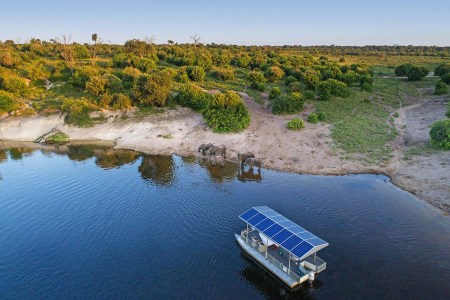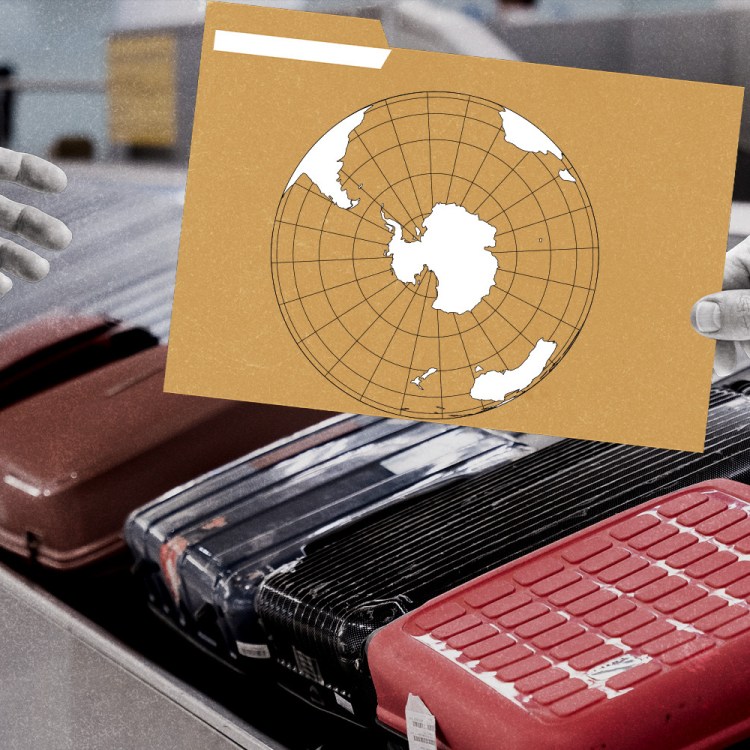Seventy years ago this year, the people of the U.K. rushed to the shops, finally permitted to buy as much sugar, meat, cheese, gas and clothing as they could afford. It was 1954. Some 15 years after the outbreak of World War II, rationing had finally come to an end. The public had almost unanimously approved of rationing in principle, but in practice it was commonplace to try to circumvent the restrictions.
So far, so history. Maybe. Jump forward to 2040: You’re at the airport with your family, ready to go on that big vacation. You’ve checked your bags and moved through passport control. There’s just one more check. “Sorry, sir,” says the grim-faced official, examining your documents, “I’m afraid you don’t have sufficient carbon credits to take this flight. Maybe next year.”
The idea of a so-called “carbon passport” is now being suggested by the tourism industry as a potential way of addressing its climate impact. Proposed by Melbourne-based “responsible travel” operator Intrepid Travel — which last year introduced carbon labeling for its itineraries, showing the total CO2 emissions of the trip per traveler per day — the idea would limit passport holders to a certain number of international flights (or a certain distance) over a certain timeframe. If that all sounds radical, it’s because it is.
“A personal carbon emissions limit may be a tool used in the future to try and curb carbon emissions if there is a lack of action to tackle the climate crisis now, alongside other initiatives like virtual vacations,” suggests Susanne Etti, Intrepid’s global environmental impact manager. “But we believe the sector still has time to align, collaborate and accelerate collective action so we can have a sustainable future for travel.”
That may still mean the imposition of restricted flights by other, often legal, means. Belgium now heavily taxes domestic short-haul flights, and France has introduced an outright ban on those where there is a workable alternative to travel by train. Both Spain and Germany are considering similar moves. After all, while experiments in hydrogen- and sustainable jet fuel-powered airliners are ongoing, it’s likely to be some years before they allow for a green alternative.
And the impact of tourism has hit home in dramatic ways recently too: Amsterdam has now set a limit on the number of cruise ships — every bit as carbon-emitting as air travel, if not more so — that it will allow to dock, while Venice has started to impose an entrance fee for tourists.
“I think it’s inevitable that we will see more tourist destinations start to think about imposing limits on tourism on the basis of green thinking,” argues Ross Bennett-Cook, an anthropologist at the University of Westminster, U.K., specializing in tourism — which, depending on the data you look at, is an industry that’s estimated to account for around 10% of global emissions every year. He suggests that we will see some tourist hotspots (the Greek islands, for example) simply closing to all tourists for certain periods of time, an admittedly risky strategy given that the economies of many such destinations are largely based on tourism. As with any climate-change mitigation scheme, a full cost-benefit analysis is warranted.
“The uproar from citizens would ensure that nobody who ever wants to get elected again would introduce a carbon passport.”
Professor Kathleen Andereck, interim director of the Center for Sustainable Tourism at ASU
Nonetheless, Bennett-Cook adds, he doesn’t see much future in the idea of a carbon passport, for all that it might appear attractive for encouraging a greater sense of personal and collective accountability.
“There is a sense that something drastic needs to be done about emissions, but tourism — and flying especially — is an easy whipping boy. So is a carbon passport realistic? I don’t think so,” he says. “Of course it’s good as a means of encouraging discussion around the matter of carbon and travel. And it’s telling that there has been a lot of positivity around the fact that tourism levels are almost back to pre-Covid levels but not much examination of whether those levels are really working. But travel is such a wonderful thing that the idea of it being restricted would, I think, be too hard to swallow.”
Indeed, while there is the immense logistical challenge — a carbon passport would require the international cooperation of multiple countries and airlines, among other interested parties — there is the libertarian one, one that might be particularly keenly felt in the U.S. More ardent climate campaigners are pushing for a future in which everyone limits their total carbon emissions to 2.3 tons each year — that’s in order to keep the predicted global temperature rise within a manageable range. That would, in effect, also kill international tourism altogether: 2.3 tons is just about enough to fly from London to New York and back. And that’s just the once.
These Travel Trendsetters in the Subarctic, Africa and Even Space May Be the Future of Carbon-Neutral Tourism
Nature tourism has a catch-22 problemBrendan Canavan, an assistant professor in marketing and tourism at the University of Nottingham, U.K., notes that while the pandemic may have revealed a readiness among people to accept government-imposed restrictions on the basis that they were temporary, perhaps a similarly temporary moratorium on international flights could work — only essential long-haul flights for the next two years, for example. “But since industries — like the travel industry — don’t tend to self-regulate, an idea like the carbon passport would have to be imposed,” he reckons. “And that would lead to huge pushback [among consumers] against one that was applied to all, because it seems like a limit on liberty.”
Carbon-credit schemes internationally have already provoked furious protest, failed or been criticized for merely shifting responsibility without actually effecting reductions. The British government proposed a “personal carbon trading” scheme in 2008, but dropped it on evidence of the public resistance that was expected to follow.
But, Canavan stresses, the challenge to introducing a carbon passport that feels fair is even more acute given the huge disparities between those people actually flying regularly and those only rarely. A 2020 study by Stefan Gössling, of the Western Norway Research Institute, estimated that only 2 to 4% of the global population flew internationally at all in 2018; and that, conversely, 1% of the world population emits 50% of the CO2 from commercial aviation. A pre-pandemic survey in the U.K., furthermore, found that only 15% of adults had flown three or more times over a 12-month period — these people accounting for 71% of all international flights made by Brits — over half of those surveyed hadn’t flown at all.
In other words, international flight is more of a luxury than many might imagine. Air travel is, in fact, the consumption category with the highest carbon contribution among the top emitters. On the one hand, one could argue then that a carbon passport wouldn’t affect most people. On the other, you could say that it’s an inequitable restriction on everyone given who is actually responsible for most international travel. “Philosophically, I think a carbon passport for those who travel the most would be much easier to apply, if only because the very wealthy aren’t going to volunteer to have their travel restricted,” says Canavan. “But it would be very hard to tell people they may have only one international holiday a year.”
It would be a brave politician who would make such a proposal. “The uproar from citizens would ensure that nobody who ever wants to get elected again would introduce a carbon passport,” laughs professor Kathleen Andereck, interim director of the Center for Sustainable Tourism at Arizona State University. She argues that while the idea of a carbon passport is intriguing, even if it could be introduced its impact would be limited: only 1 to 2% of global emissions would be affected.
“The idea I think comes partly out of desperation — it feels like a quick solution,” she adds. “I think if people’s international travel was limited, they’d turn to making more short-haul flights instead, assuming that was possible. What we really need is a more comprehensive approach to tourist travel [and its climate impact], not least in changing behavior — when people travel they tend to do things they wouldn’t do at home, like turning the heating or the AC up because they feel like they’re not paying for it.,”
Andereck argues that a better response to tourism’s emissions than limiting flights would be the introduction of conservation taxes on hotel bills — money that could subsidize sustainability projects — and a greater investment in ground transport, rail infrastructure in particular. That type of transportation is not great in the U.S., and only very good in pockets across Europe. South Korea and Japan are investing heavily in upgrading their rail networks, which works well for domestic travel of course — but try getting to Japan without a flight first. Intrepid says that it expects to see a shift to more ground transport, over flights, in the coming years and is working towards its customers taking 2,000 fewer flights this year, relative to 2023, by replacing flights with high-speed rail travel instead.
But there are still those who say a carbon passport could work, given the right conditions. William Higham, founder and CEO of trend analyst Next Big Thing, argues that a voluntary carbon passport could make it easier for people to act on reducing their carbon footprint, especially as, thanks to AI, we move into an age of increased and more effective data tracking and analysis. Some predict that today’s younger generations will be only too willing to use real-time carbon emissions tracking to assess the impact of every trip they make, no matter how short or local. The insight afforded by this data flow may prove especially pertinent given that, according to Intrepid’s research, most people have no idea what their carbon footprint is, even if most say they are nonetheless keen to reduce it.
“Anything that quantifies an individual’s actions, gives them parameters, is a positive when that individual is uncertain — given all the confusion and misinformation — about what they can be doing in relation to climate,” Higham argues. “If the emissions impact of flying was ‘gamified’ through an app you can imagine it giving people bragging rights. It’s something a company might sign up for too for its business travel. The motivation of showing off might sound like a cynical one, but this is really about being able to feel good about actually doing something concrete.”
This article appeared in an InsideHook newsletter. Sign up for free to get more on travel, wellness, style, drinking, and culture.

























